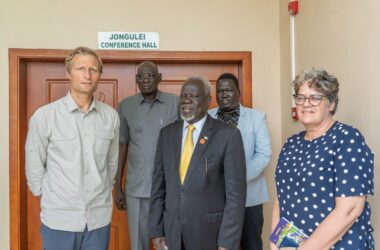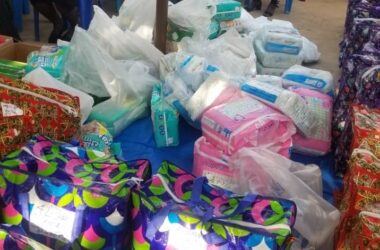By Kei Emmanuel Duku
Gorom, located 26 kilometers from Juba City has received first first-ever Secondary School, which will serve both refugees and the host community.
Although still under construction and currently 75% complete, the school is poised to serve between 350 and 400 students, primarily refugees from Ethiopia and Sudan, as well as members of the local community.
The ongoing construction project is a joint effort by the Canaan Group of Companies, UNHCR, and the UN Refugee Agency, with an estimated cost of $200,000.
The initiative was spearheaded by Bereket Goitom, a former refugee who grew up in Sudan after escaping conflict in Ethiopia.
Once operational, Gorom Secondary School will be the first post-primary institution in the area, filling a significant gap in educational opportunities.
However, Dr. Kuyok Aboul, Undersecretary of the Ministry of General Education and Instruction, noted that the school still lacks essential items such as blackboards, desks, and a library.
“The school is not yet complete, and I cannot accept an incomplete facility,” Dr. Aboul said. “Together with UNHCR, and Canaan Properties, we will ensure that the school is ready for next year’s February intake.”
The National Ministry of General Education and the Central Equatorial State Ministry of Education will recruit a head teacher and teaching staff to manage the school according to Dr Kuyok.
Gorom Refugee Settlement was established in 2010 to host over 25,000 refugees from Ethiopia. The conflict in Sudan in 2023 brought an additional 7,000 refugees to the settlement.
According to UNHCR-South Sudan, there are currently about 14,584 Sudanese refugees and 400,000 host communities in Gorom.
Bereket Goitom, CEO of Canaan Groups, emphasized the importance of education for refugees.
“I studied in a refugee school in Sudan and know the challenges they face,” he said. “Investing in education is crucial for the future of these communities.”
Gloria Nyakia, UNHCR Assistant Representative-Protection, said the school is expected to accommodate 350-400 students once it is fully operational.
The school still lacks a fence, a source of clean drinking water, and other necessary sanitary facilities.
However, UNHCR and the government are working to complete these remaining works before handing over the school to the government.
Charles Lino, UNHCR Head of the Field Unit, expressed gratitude to the Gorom community for donating land for the school and expressed hope for future expansion.
Amina Adam, a Sudanese refugee who has been in Gorom for over a year, noted that the lack of secondary education has led to an increase in school dropout rates among Sudanese refugees.
Many students face long distances to access education and some have relocated to urban areas to continue their studies.
Adam praised the Canaan Group of Companies for creating job opportunities for refugees during the construction project.
Despite the challenges, Eltijani Salh, Chairperson for Sudanese Refugees in Gorom, reported no cases of early marriages within the camps.
He highlighted the need for teachers who can teach in Arabic since English is the medium of instruction in many South Sudanese schools.



